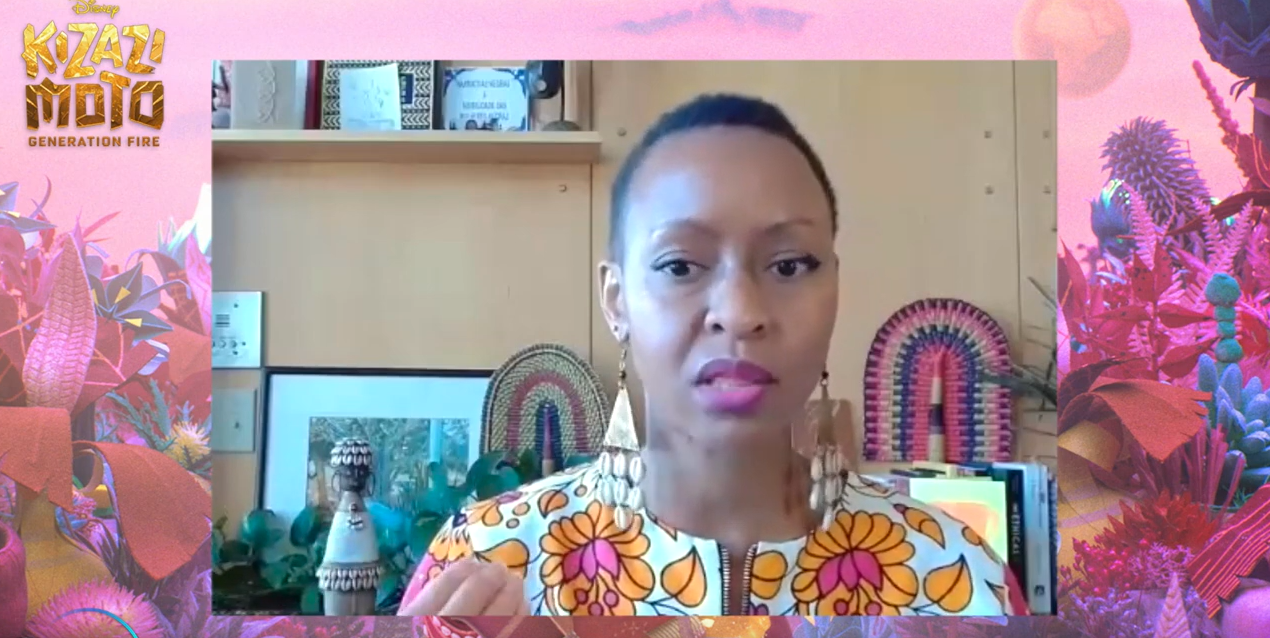"As the winds of change shift internationally and the world confronts new realities, Africa is taking center stage," said festival founder Mahen Bonetti. "And African filmmakers are poised to reclaim and rewrite our own history, take ownership for our own identity and set the course for our collective future."
[Entertainment: African Film Festival]
Through the lenses of emerging directors and veteran filmmakers, the 16th Annual New York African Film Festival (NYAFF) will take an introspective journey across the African continent, with films that create a vision of Africa’s future through a deconstruction of its past.
Under the banner “Africa in Transition,” the festival will present a lineup of 35 films from 16 countries throughout Africa and the African Diaspora.
Exemplary of this metamorphosis is South Africa. This year’s festival marks the 15th anniversary of South Africa’s independence and comes just days before voters there head to the polls to select a leader for the fourth time since the end of apartheid; April’s elections will be closely watched as they may be a political sea change for the country, with broad international implications.
Presented by African Film Festival, Inc. (AFF) and The Film Society of Lincoln Center (FSLC), the 16th annual NYAFF runs at The Film Society of Lincoln Center April 8 through 14, continues with a panel discussion at the Columbia University’s Institute of African Studies on April 15 and wraps up at the Brooklyn Academy of Music’s BAMcinématek from May 22 through 25.
Opening night brings the U.S. premiere of Jihan El-Tahri’s Behind the Rainbow on Wednesday, April 8. In the film, El-Tahri, best known for her Emmy nominated documentary, The House of Saud, and for Cuba: An African Odyssey, probes the history of the governing African National Congress (ANC) party, from Mandela’s release from prison to the election of Jacob Zuma as the party’s new leader. The director, veteran African actor Isaac de Bankolé, Sahr Ngaujah (star of Fela!), and others will be in attendance at a special, invitation-only festival Opening Night Reception preceding the film. 
Jerusalema, a tale of a self-made Sowetan entrepreneur climbing the Hillbrow criminal underworld ladder one rung at a time, will have its New York premiere on Friday, April 10. The film, which will be introduced by its director Ralph Ziman, takes an unwavering and blisteringly stylized look into the crime, corruption and transgressions of the new South Africa. The film will be followed by the AFF Annual Gala Celebration, a fundraiser for its programs.
“As the winds of change shift internationally and the world confronts new realities, Africa is taking center stage,” said festival founder Mahen Bonetti. “And African filmmakers are poised to reclaim and rewrite our own history, take ownership for our own identity and set the course for our collective future.”
One country that most captures that evolution is South Africa, which held its first all-race, post-Apartheid democratic elections 15 years ago. As the world waits with bated breath, the country is poised to elect a new government on April 22.
With Nelson Mandela long retired, a new generation of leaders governs the country. In some senses they have become ordinary politicians, who are grappling to maintain the grand ideals that drove the struggle against apartheid. It is both the best of times and the most challenging of times.
Many films in this year’s New York African Film Festival speak to South Africa’s changing tides. In addition to El-Tahri’s Behind the Rainbow and Ziman’s Jerusalema, Triomf, by veteran-director Michael Raeburn, also shines a light on the challenges facing the country post-apartheid; Raeburn’s film depicts the plight of South Africa’s white poor on the eve of the first democratic elections in April 1994. Young filmmaker Kurt Orderson, who would have been classified as Coloured (or mixed-race), presents his own story in Prodigal Son, and reflects on the hodgepodge that is South African identity. Rounding out the focus on South Africa is the artists collective, Filmmakers Against Racism, which produced a series of short films in response to the xenophobic incidents that rocked South Africa in 2008.
The festival also highlights a new generation of emerging filmmakers who offer a perspective of Africa that shifts the realities and possibilities of the continent and reconfigures its future. Three up-and-coming female Kenyan filmmakers have films in the Festival that speak to these issues. Lupita Nyong’o in her film In My Genes boldly challenges the stigma surrounding albinism in Africa; Judy Kibinge in Coming of Age tells the story of a young Kenyan girl’s disquieting realization of national politics in the 1970s; and Wanuri Kahiu’s From a Whisper commemorates the tenth anniversary of the August 1998 terrorist bombing of the U.S. Embassy in Nairobi, Kenya, in which more than 250 people died and more than 5,000 were injured. Meanwhile, the 21st century reality of young African asylum seekers within Europe and Africa is explored in Omelihu Nwanguma’s Area Boys, Jose Laplaine’s Le Clandestin and Josephine Ndagnou’s Paris or Nothing / Paris A Tout Prix.
It is not, however, only the new generation of filmmakers that is being boldly introspective. Veteran filmmakers Jean-Marie Téno, Africa’s preeminent documentary filmmaker, and Mahamat Saleh Haroun, whose 2006’s Daratt won the Grand Special Jury Prize at the 63rd Venice International Film Festival, are back with films that question the purpose and direction of African filmmaking. With Sacred Places, Téno designates the drum as the big brother of cinema and asks African filmmakers who their audience is—and who it should be. Haroun surprises us with a comedy in Sex, Okra and Salted Butter. It is a film made in the Diaspora, about Africans in the Diaspora, suggesting that the African village can be recreated anywhere. These films challenge African filmmakers to ask themselves what their roles and responsibilities are to the continent, and whether an African audience should be the focus. 
Sometimes relics of the past are needed for the journey onward into the future. Coming-of-age tales Wrestling Grounds / L’Appel Des Arenes, From a Whisper, African Booty Scratcher, Kinshasa Palace, Bronx Princess and Nora all follow young people, who reclaim cultural legacies and histories to create opportunities for themselves. Historically rich in content, Yandé Codou, The Griot of Senghor and Siki, Ring Wrestler expand on this idea, all exploring the lives of well-known individuals who have walked the path of rediscovery and found value in the journey that would later influence many generations to come. Singer Yandé Codou Sène is one of the last of purveyors of polyphonic Sérère poetry, and Yandé Codou, The Griot of Senghor is an intimate look at this diva, who has gone through the history of Senegal at the side of one of its greatest mythical figures, President/poet Léopold Sédar Senghor. The film is a bittersweet story about greatness, glory and the passage of time.
Wrestling Grounds / L’Appel Des Arenes and The Fighting Spirit join Siki, Ring Wrestler as films that capture the transformative power of sports.
The intersection of past and present is a theme that will be further explored in 2010’s festival, as the New York African Film Festival reflects upon 50 watershed moments in African history, which still intimately affect the world today.
The first segment of the festival will be held at FSLC’s Walter Reade Theater, 165 W. 65th Street, Plaza Level, from April 8 through April 14. During this time the visually stunning works of fine artist Michelle Hill, whose colorful works marry technology and tradition, will be exhibited in the Frieda and Roy Furman Gallery. “My intent is to breathe new life into the retelling of ancient legend and folk myth. I want to present stories in a contemporary high-tech idiom to awaken an international audience, that already embraces the digital culture, as well as to exploit this technology to give new life and expression to ancient myths,” said Hill.
It then moves on to Columbia University, where AFF will collaborate with Columbia University’s Institute of African Studies for a day of free films and panel discussions. A feature-length film will be shown from 12:00 p.m. to 2:00 p.m., followed by two shorts from 3:00 p.m. to 4:30 p.m. The day will conclude with “Beyond the Rainbow: 15 Years into South Africa’s Democracy,” a panel discussion hosted by Professor Mamadou Diouf, Institute director. The event, which will run from 6:00 p.m. to 8:00 p.m. and be followed by a free reception, will examine the idea of nationhood in post-Apartheid South Africa. With the upcoming elections of National Assembly it is fitting to review the shifts in identification that have taken place over the last 15 years and consider the various ways in which South Africans currently envision themselves and their relationship to both the rest of the continent and the rest of the international community.
NYAFF concludes at Brooklyn Academy of Music’s BAMcinématek in tandem with DanceAfrica from May 22 through May 25. There, contemporary African cinema will be the focus. BAMcinématek is located at 30 Lafayette Avenue in Brooklyn.
The 16th New York African Film Festival is organized by Richard Peña of The Film Society of Lincoln Center and the African Film Festival, Inc. (Mahen Bonetti, Toccarra Thomas, Aba Taylor, Muriel Placet-Kouassi, Alonzo Speight and Hellura Lyle). Special thanks is given to the AFF Board of Directors, Joan Baffour, Luca Bonetti, Francoise Bouffault, Sean Jacobs, Mamadou Diouf, Sarah Diouf, Gabriel Donati, Jacki Fischer, Belynda Hardin, Morgan Seag, Alexander Markov, Andrew Milne, Philippa Naughten, Prerana Reddy, Keith Shiri, Cheryl Duncan & Company Inc. P.R., Kojo Associates and AFF’s volunteer team.
The programs of AFF are made possible by the generous support of the National Endowment for the Arts, The Andy Warhol Foundation for the Visual Arts, JPMorgan Chase, New York State Council on the Arts, NYC Department of Cultural Affairs, International Organization of La Francophonie, Divine Chocolate, Domenico Paulon Foundation, New York Foundation for the Arts, New York Times Community Affairs Department, South African Consulate-General, Time Warner Cable, French Cultural Services, Bloomberg, Tides Foundation, Columbia University’s Institute of African Studies, GoCard, WNYC, Continental Airlines, 57 Main St. Wine Company, Putumayo World Music, Royal Air Maroc and Omnipak Import Enterprises, Inc.
For more information on African Film Festival, Inc. and The Film Society of Lincoln Center go to www.africanfilmny.org and www.filmlinc.com.





